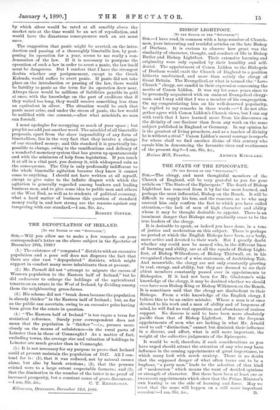THE STATE OF THE EPISCOPATE.
[To THE EDITOR OF THE " SPECTATOR."' Sat—The clergy, and most thoughtful members of the Church of England, will be very grateful to you for your article on " The State of the Episcopate." The death of Bishop Lightfoot has removed from it by far the most learned, and perhaps the most influential, Bishop on the Bench. It will be difficult to supply his loss, and the rumours as to who may succeed him only confirm the fact to which you have called attention,—the lack of men of high character and ability whom it may be thought desirable to appoint. There is an imminent danger that Bishops may gradually cease to be the true leaders of the clergy.
It is desirable to speak, as indeed you have done, in a tone of justice and moderation on this subject. There is perhaps no period at which the English Bishops have been, as a body, more active and devoted to their work. But I greatly doubt whether any could now be named who, in the different lines of learning and ability, are at all the equals of Bishop Light- foot, of Bishop Wilberforce, of Bishop Thirlwall, or, in his recognised character of a wise statesman, of Archbishop Tait. And meanwhile, the clergy are not only constantly growing in zeal, energy, and ability, but they are doomed to see their ablest members constantly passed over in appointments to Bishoprics. If it had not been for Mr. Gladstone's wide knowledge of the clergy, it may be doubted whether we should ever have seen Bishop King or Bishop Wilkinson on the Bench. It is sometimes said that the clergy are disobedient to their Bishops. From a wide knowledge of the English clergy, I believe this to be an entire mistake. Where a man is at once devoted to his work and a man of ability and of largeness of mind, he will find no real opposition, and abundance of zealous support. No diocese is said to have been more absolutely pacific than that of Bishop Lightfoot. But the frequent appointments of men who are lacking in what Mr. Arnold used to call " distinction," cannot but diminish their influence in a diocese, and affect, what is still more important, the weight of the collective judgments of the Episcopate.
It would be well, therefore, if such considerations as you have urged should attract the attention of any who may have influence in the coming appointments of great importance, to
which many look with much anxiety. There is no doubt that the supposed danger of what often turns out to be a
bugbear, " a party man," leads to the selection of that kind of " moderation " which means the want of decided opinions or strength of character. But there have been at least one or two recent appointments which show that the Prime Minister's own leaning is on the side of learning and force. May we trust that the same will happen on a still more important














































 Previous page
Previous page